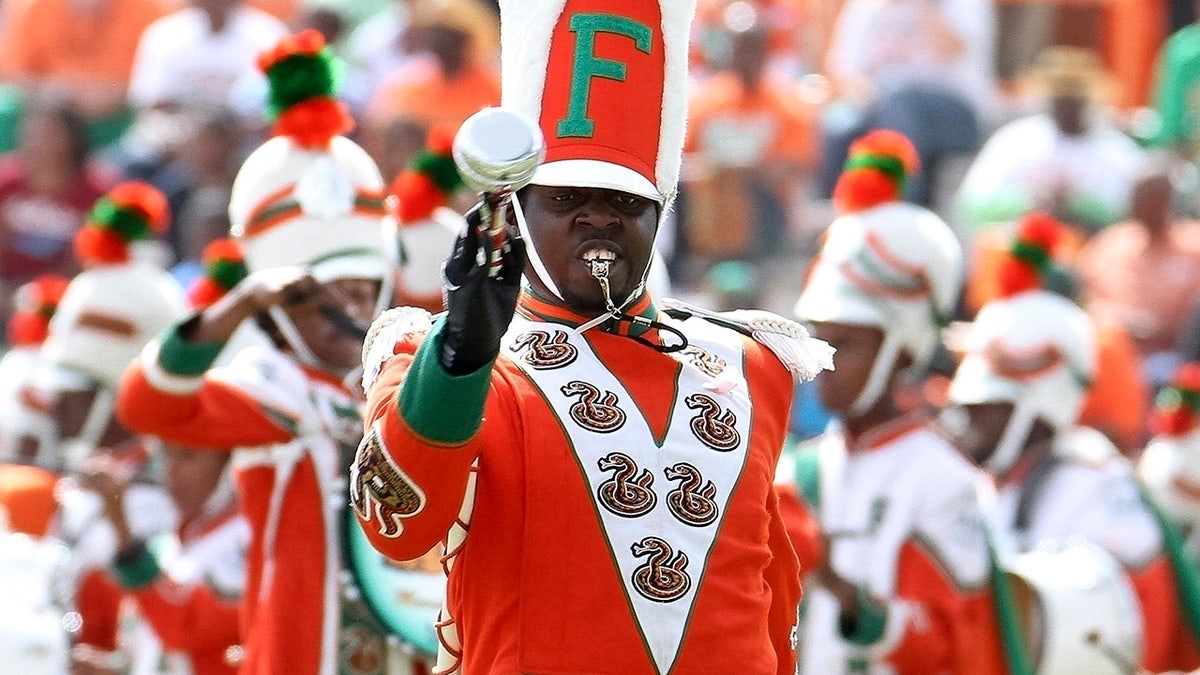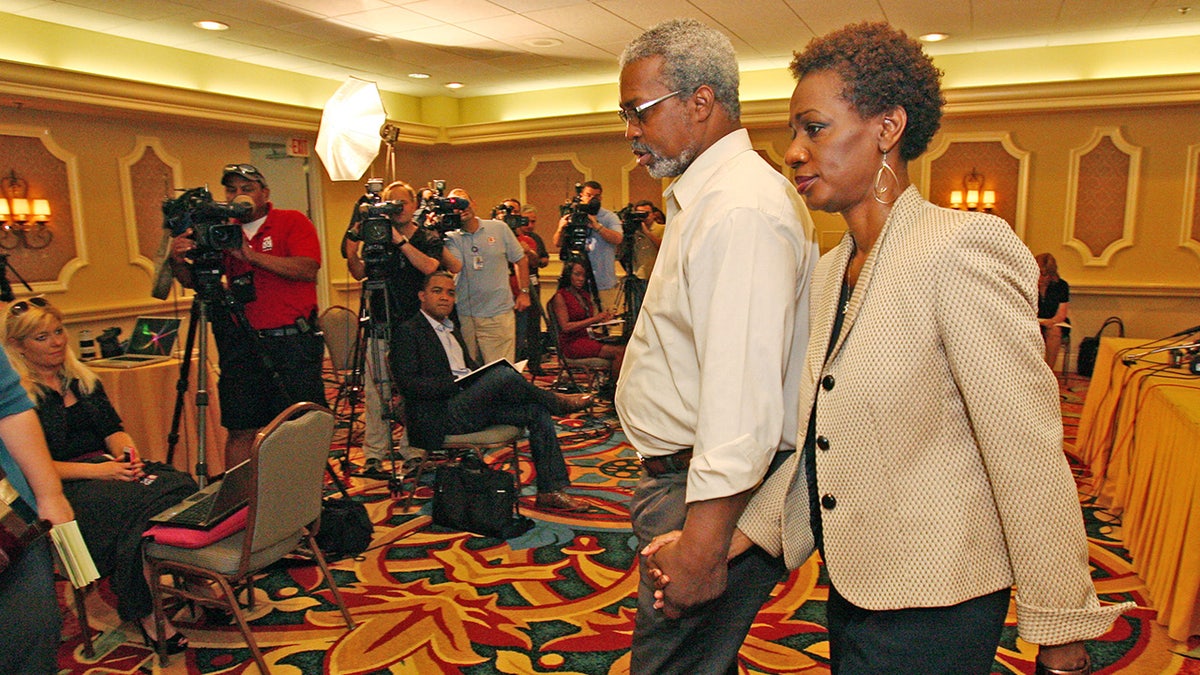[ad_1]
Robert Champion’s mother, Pam Champion, stared at her phone after hearing the heartbreaking news that left her breathless. Her son had collapsed and died.
“My son had a physical, and he was healthy,” Pam recalled to Fox News Digital. “I was trying to figure out what could have made my child just die so suddenly. I spent the whole day trying to figure that out, only to find out that it was all a lie. He didn’t just collapse and die. What happened was the unthinkable.”
Champion, a Florida A&M drum major, was killed in November 2011. He was 26. His case is featured in Investigation Discovery’s (ID) true-crime series, “Murder Under the Friday Night Lights.” It examines homicides involving high school and college football teams.
FORMER RUSSIAN SEX SPY SAYS SHE WAS TRAINED AS A ‘MASTER MANIPULATOR’

In this Oct. 8, 2011, file photo, Florida A&M Marching 100 Drum Major Robert Champion performs at halftime of a game against Howard University at Bragg Memorial Stadium in Tallahassee, Fla. (AP Photo/Don Juan Moore)
Pam said it wasn’t until the next day that she heard her son’s name on the local news. The broadcast showed a photo of him she didn’t recognize. She soon learned her son had bruises on his chest, arms, shoulders and back when he died. Witnesses told emergency dispatchers Champion was vomiting before he was found unresponsive.
“My son didn’t just collapse and die. He was beaten to death,” said Pam. “He was murdered. And I needed to know what happened.”
Champion, who was part of the famed Florida A&M University (FAMU) Marching 100, was described as an inquisitive child who always had a passion for music. He fell in love with the marching bands of Georgia, where he was born, and dreamed of becoming a drum major.

A young Robert Champion with his family. (ID)
“He identified drum majors as gentlemen with their capes, long tail jackets and high hats,” said Pam. “He wanted to be one of them. Robert had a tender heart for people. He never met an enemy. He trained to play the clarinet, played the drums at our local church and taught himself to play the keyboard. Music was his love. And he wanted to share that love with others. He found joy in performing in front of a large audience and dancing.
“He was large in stature but very gentle. He even volunteered to be an organ donor because he wanted to help save a life. And that’s how he felt about people.”
As Champion thrived at FAMU, Pam vividly recalled one conversation she had with her son.
FOLLOW THE FOX TRUE CRIME TEAM ON X

Robert Champion leading his band (ID)
“Rob was talking about how people were trying to get him to do something,” Pam explained. “He never identified what that was, but he didn’t want to do it. My comment to him at the time was, ‘You don’t have to do anything you don’t want to do. You’re in control.’ But in terms of him using the term ‘hazing,’ that never occurred.”
Champion appeared “tired” the last time his mother saw him.
“He didn’t seem the same,” Pam recalled. “He was backing out of the driveway. I said, ‘Rob, the only thing I want for you is to be happy.’ And he said, ‘Oh mom, you know me.’ It wasn’t unusual for him to stay in his room playing his instruments, but it was just something about his demeanor. But he never disclosed anything that went on within the marching band.”

Robert Champion died in 2011. He was 26. (ID )
According to the Orange County Medical Examiner, Champion died of “hemorrhagic shock due to soft tissue hemorrhage, due to blunt force trauma.” The episode revealed that, just hours before his death, Champion had marched with his band during a football game between Florida A&M and Bethune-Cookman University.
Pam claimed she had to call the school numerous times to get any details about what happened to her son that night.
“It took six months for the Orange County prosecutor at the time to contact us at all,” said Pam. “We heard nothing from them. Everything we got came from the media.”
SIGN UP TO GET THE TRUE CRIME NEWSLETTER

Pam and Robert Champion Sr. were determined to find out what really happened to their son. (Getty Images)
According to Pam, a reporter stopped by her house with “stacks of complaints that rose high,” revealing a horrifying culture of hazing within the band.
“This was no secret to the school, the violence that went on,” Pam alleged. “And the hard thing for me was, you had staff within the band that was supposed to be educating the students about hazing. There’s corruption and negligence. … And for the school to take a stance and say publicly that they were not responsible for my son’s death – how low can you go? Was my son Robert responsible for his own death?”
Interviews with defendants and other band members revealed Champion endured a brutal ritual known as “crossing over.” The university maintained that Champion, who witnessed others being hazed, consented to the ritual to gain respect among fellow band members.

Florida State Attorney Lawson Lamar announces charges in the hazing death of FAMU drum major Robert Champion May 2, 2012, in front of the Orange County Courthouse in Orlando, Fla. (Jacob Langston/Orlando Sentinel/Tribune News Service via Getty Images)
With chances for initiation ending with the football season, fellow band members said Champion agreed to run through a gauntlet of people kicking and beating him with drumsticks, mallets and fists. The hazing took place aboard “Bus C,” which was described as the band’s notorious venue for hazing after its performances during FAMU football games.
What awaited Champion was a punishing ordeal in which about 15 people pushed, struck, kicked and grabbed at participants as they tried to wade down the aisle from the bus’s driver’s seat to touch the back wall, according to interviews. One witness said bigger band members waited at the back to make the final few steps the most difficult. Several others who went through it said the ordeal leaves participants dizzy and breathless at a minimum.
After finishing the gauntlet, Champion vomited and complained of trouble breathing. He quickly fell unconscious and couldn’t be revived. An autopsy concluded Champion died from shock caused by severe bleeding.
GET REAL-TIME UPDATES DIRECTLY ON THE TRUE CRIME HUB

Robert Champion, left, and his wife Pam leave after a news conference about new developments of the hazing death of their son Robert D. Champion, a FAMU drum major. (Red Huber/Orlando Sentinel/Tribune News Service via Getty Images)
Champion’s death illustrated how ingrained hazing was in the band, although previous hazing incidents were well documented at the school in lawsuits and arrests. Two band members previously received serious kidney injuries during hazing beatings, and another member suffered a broken thighbone just weeks before Champion’s death.
Still, going aboard “Bus C” was voluntary, defendant Caleb Jackson told detectives. Pam said she and her family had a hard time believing Champion, who was outspoken about hazing, would agree to such brutality. They noted that “no one signs up for murder.”
Even though band members are required to sign a pledge promising not to participate in hazing, initiations were planned that night for Champion and two other band members. Along with “crossing over,” the bus was also known for “the hot seat,” which involved getting kicked and beaten with drumsticks and bass drum mallets while covered with a blanket.

A jury found Dante Martin of Florida A&M University’s Marching 100 band guilty of manslaughter in the fatal hazing of drum major Robert Champion. (Red Huber/Orlando Sentinel/Tribune News Service via Getty Images)
Fifteen former band members were charged in Champion’s death. Purported ringleader Dante Martin was sentenced to 6½ years in prison in 2015. Jessie Baskin served just shy of a year in county jail after entering a no-contest plea to manslaughter. Most of the others were sentenced to community service and probation.
Jackson, 26, pleaded no contest to manslaughter and hazing in 2013. He was sentenced in 2015 to four years in prison. Jackson’s sentencing ended all prosecution in the case.
Longtime band director Julian White resigned in 2012 and contributed to the resignation of university President James Ammons.
CLICK HERE TO GET THE FOX NEWS APP

Shawn Turner, Florida A&M University marching band drum major, enters an Orange County courtroom June 14, 2012. Turner was appointed a public defender in the hazing death of drum major Robert Champion. (Pool photo by Red Huber/Orlando Sentinel/Tribune News Service via Getty Images)
That same year, a report from the Florida Board of Governors inspector general’s office concluded the university lacked internal controls to prevent or detect hazing. It cited a lack of communication among top university officials, the police department and the office responsible for disciplining students.
A spokesperson for FAMU didn’t immediately respond to Fox News Digital’s request for comment about Pam speaking out in the series.

Former FAMU percussionist Caleb Jackson April 16, 2013, before he entered a plea of no contest in Orange County court. (Red Huber/Orlando Sentinel/Tribune News Service via Getty Images)
Today, Pam is co-founder of Be A Champion, a foundation that aims to raise awareness of the violence of hazing and other forms of bullying.
“We have to make it public that this isn’t acceptable,” said Pam. “We have to follow through with tough laws. … Every year, a young student loses their lives to this nice fluffy word called hazing. That has to stop. … And students have the power to end this. They just don’t know they have that power. They have the power to refuse. We need to combat this infectious disease we call hazing, one that is well covered, treatable and preventable.

Pam Champion, mother, 2nd right, and Robert Champion, father, right, listen as the verdict is read Oct. 31, 2014, after a jury found Dante Martin, a former member of Florida A&M University’s Marching 100 band, guilty of manslaughter in the fatal hazing of drum major Robert Champion Jr. (Red Huber/Orlando Sentinel/Tribune News Service via Getty Images)
“Robert was known to speak out against violence,” Pam reflected. “He wanted to help others. I’m here to do that for him.”
ID’s “Murder Under the Friday Night Lights” is available for streaming on Max. The Associated Press contributed to this report.
[ad_2]
Source link